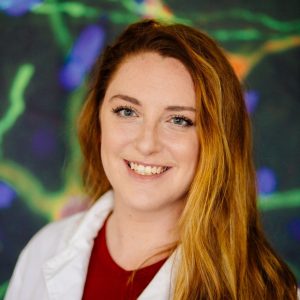Dr. Katie Yoest, on re-evaluating your path and taking risks.
Tell us about your background and what led you to become a postdoc at Michigan State University.
Katie Yoest – I completed my PhD in Behavioral Neuroscience at University of Michigan, investigating how hormones can regulate the brain differently in males and females. During my graduate studies, I not only solidified my passion for behavioral neuroendocrinology and the study of sex differences, but also fell in love with Michigan as a place to live. Michigan State has a strong contingent of behavioral neuroendocrinologists, and my former mentor in particular has a strong track record of doing rigorous science with an emphasis on the inclusion of both male and female subjects. It was the perfect fit!
Tell me about your current role; how did you decide to pursue this position?
I am currently a Medical Writer with MedThink SciCom, a Medical Communications agency based in North Carolina. My role focuses on developing scientific communications (publications, abstracts, posters, and more) for late stage neurology clinical trials. I definitely didn’t see myself going into this field when I started my postdoc, mostly because I didn’t really know it was something that existed! During the pandemic, I realized that I was no longer passionate about pursuing an academic career path, and a former colleague put me in touch with a friend who worked in the Medical Communications field. It sounded like the perfect fit – a role where I could think about science at a high level, make an impact on the therapeutic process, and work with really smart and passionate people (but perhaps with more work/life balance than I would get as an Assistant Professor). I started applying for Medical Writing roles earlier this year, and officially made the switch in May.
How did your postdoctoral experience prepare you for your current role?
Writing experience is a big one, but I think it also is about being flexible and throwing yourself into a new subject area. Being able to learn new things quickly and independently is key for Medical Writing, and its definitely a skill that I developed as a postdoc.
I also think that my time as a postdoc really taught me what I wanted out of my career (and what I didn’t want). Having the flexibility to try new things and learn about different career paths was really important in solidifying my decision to pursue the field that I’m in now.
You were an active member of the PDA while at MSU, how did this shape your postdoctoral experience?
My former lab-mate was the Co-chair of the PDA steering committee, and when she was leaving MSU she urged me to join to make sure that things kept running smoothly. I became Chair of the Communications and Digital Presence subcommittee, which not only kept me up to date on everything going on within the postdoc community at MSU, but also allowed me to develop my writing skills within a non-academic context. Managing the PDA website and weekly updates made me really think critically about how we can use communications to build connections between postdocs, who often may be siloed in their individual labs and departments. When I was on the job market, this experience really allowed me to stand out amongst other candidates.
What is your advice for other postdocs looking to find a job outside of the academy?
Do as many informational interviews as you can. Talk to people who have jobs that you would be interested in, ask them what they like about their job, what their day to day looks like, how they ended up in that career. Speaking with other former postdocs who are now working as Medical Writers really solidified that it is the right field for me, everyone I spoke to echoed so many of the same things that I was feeling about my path. And every connection you make could end up leading to a job – most of the interviews I received were from someone referring me to their company after an informational interview.
Also, change is hard but worth it. When I left my postdoc, I ended up terminating my NSF fellowship early, and it was really hard to take a risk on the unknown when I knew I had a stable position where I already had all the skills to do my job. But it’s also important to take opportunities when they present themselves, and the scariest challenges can also be the most exciting!
What do you hope to achieve in the next year, in all aspects of life?
I hope to feel confident in my new role and start really progressing in my career. I’m really looking forward to having time to live my life outside of the lab, and maybe start to really put some roots down now that I have a more permanent position!
To wrap it up, and to know more about you, tell me what comes to mind first in this rapid round of questions!
Favorite food – French fries, or salmon
Favorite way to spend a day off – Taking a work out class, going to brunch with friends (preferably on a patio), and then maybe reading a good book (or watching Real Housewives).
Favorite holiday – Christmas, I’m obsessed. I’m always so excited I end up decorating by early November.
Favorite place you ever visited or lived – Visited – the Galapagos Islands. My work has always been really influenced by evolutionary perspectives, so it was wild to be able to see some of the same places that had sparked Darwin’s theory in person.
Job you would do if it wasn’t research – Well, other than what I’m currently doing – I used to always want to be a zookeeper for tigers (my favorite animal). I also think I would be good at marketing.





